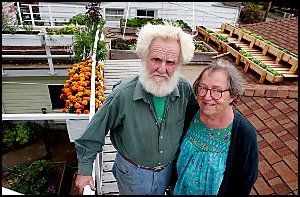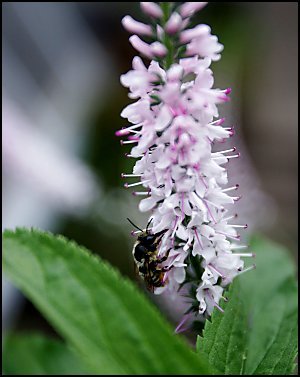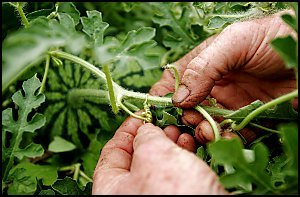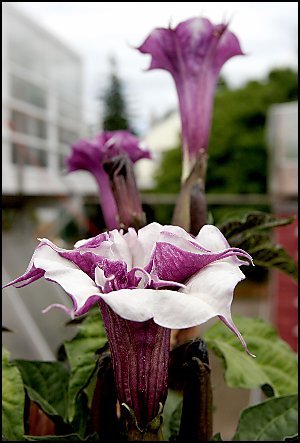
| Home |
| Taking Responsibility |
| Global Warming |
| Local Food |
| Grow Your Own |
| About Start Now and Glenn & Jean |
| Contact Us |
The Victory Garden
Revisited
By Shawna Walls West Bremerton Using the space where most homes have a lawn and shrubs, Jean Schanen and Glenn Huff help feed their neighborhood. On a narrow street in West Bremerton, the front yard (and the back yard, and the deck above the back yard) of Schanen and Huffís modest house is eye-catching. Raised planting beds are filled, not with flowers or decorative foliage, but with melons, cucumbers and eggplant. A thick crop of basil lines the front walk, brushing its appetizing scent on any visitor approaching the home. "Itís a garden for the community," Schanen said of the extensive edible plantings all around her home. Much of what Schanen and her husband raise is sold directly to neighbors. The rest of the crop is sold just a few blocks away at Evergreen Market. Growing food at home is nothing new, of course. Among fluffy hydrangeas and colorful bulbs, many Northwest gardeners include the occasional fruit tree or tomato vine. However, not since the days of Victory Gardens in World War II have many Americans gotten a significant portion of their food from a local source. The buzz of busy modern lives means meals are often pre-packaged. Rapid shipping brings produce from around the world to stack high in huge supermarkets. Yet there are significant benefits, Schanen said, to small-scale agriculture. Locally grown seasonal produce is easier to farm sustainably and organically, she said, and with little need for transportation or heavy farm equipment, the environmental and fuel costs of production and shipping are curbed. "Thereís a huge energy savings involved in having food thatís grown at home or in the neighborhood," Schanen said. The benefits of community-based agriculture go beyond conserving resources. Advocates such as the National Gardening Association point out that home gardens can also supply food in an emergency. In the event of a disaster or other crisis that blocks grocery supply chains, having a community food garden can keep people fed until shipping can resume. Schanen said she and Huff first became interested in growing food crops when they lived in Belize from 1980 to 1993. With no prior gardening experience, they put together an extensive farm project by researching at local libraries. After they returned, they settled in Wisconsin, and set up a project there. Three years ago, they retired and moved to Bremerton to be near their children, who live in Seattle. The local climate is ideal for home agriculture, Schanen said. "You can grow stuff year-round here." It took some time to convert their yard into a fertile place to grow food, but with composting, hard work and the ingenuity of Huff, an engineer, they got things going. "We make a very good team," Schanen said. "Iím research, heís development." Schanen said they hope to set up a Community Supported Agriculture program by next year. These are arrangements in which members buy shares in a local farm in the winter that entitle them to a portion of the crop during harvest season. This helps sustain gardeners through the low production season, and ensures planting enough for demand at harvest. Another benefit to the project, Schanen said, is getting to know the community. Their garden attracts attention from passers-by, and several houses in the neighborhood now have food gardens of their own. Neighbors frequently drop by to buy an item or two, or share what theyíve grown. "Itís a wonderful way to meet
people," Schanen said. |
|





